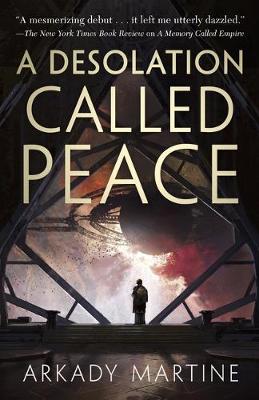
pamela
Everything about A Desolation Called Peace is something I should like. It’s the kind of literary sci-fi that I usually adore, but I appear to be in a minority of people who simply couldn’t get into it. There is no doubt that Arkady Martine is a lovely, florid writer. She has an evocative way of using language that reads beautifully - in moderation. But moderation is not something we get, so instead, A Desolation Called Peace is a story that talks itself to death. Like A Memory Called Empire, it was so full of “big ideas” that it kind of ran out of time to tell the story, so the result was a lot of reading of internal monologues and very little plot direction.
The bulk of my review contains spoilers, so read at your own discretion:
I was hopeful when the book started that we’d get some kind of analysis of Colonialism. When Mahit bought the graphic novel back on Lsel, it set up a really interesting plot direction where Mahit could grow to love her own culture and breach the duality of her “barbarian” status and her love for Teixcalaan. But that whole plotline just sort of fizzled into nothingness, and instead, what we got is that Teixcalaan was right. The stationers are just barbarians. Mahit just has to accept that she’ll never be a part of either place.
For a book that seems to centre so solely around politics, the stationer politics were really, really under-developed. Amnardbat had the potential to be an interesting villain because she had that drive to protect Lsel *at all costs*, which could have been developed into a fascinating anti-hero /not-quite-evil villain element, but that fizzled out as well. Mahit and Three Seagrass were, hands down, the most boring part of this book, and I ended up skimming most of their POVs.
I enjoyed the collective minds sub-plot, but I felt like it was just dealt with in such a ham-fisted way that the second that Mahit mentioned that the aliens might have a silent way of speaking, anyone who has consumed any sci-fi media in the last decade would have guessed the entire central premise almost immediately. I immediately thought, virus or spores – the plots were both simplistic and wordy reworks of The Expanse, and Star Trek: Discovery; powerful empires trying to politically control small mining stations who use an outside alien threat (also spores) to work in their favour, and a mycelial network that communicates on a different plane of time and space respectively.
But my biggest issue is perhaps that A Desolation Called Peace lacked motivation for anything. The central premise is the alien attack, but I simply don’t understand a) why they were attacking in the first place, or b) why they were willing to negotiate after they had. If their neural network truly is a “we” then the motivations of both would need to be considered, and the wholesale destruction and the resulting massacre on Peloa-2 simply don’t fit any motivations that I can understand.
The thought process seemed to be a scavenger culture infected with a symbiotic fungal spore whose borders are being nipped at by the Empire, unbeknownst to the Empire. But a symbiotic relationship between the two species means they know both means of communication (physical and spore-linked) and are already able to communicate in glyphs so they must have some kind of written language, etc. With is in mind an attack without communication for a species that, in the prelude of the novel no less, claim to despise waste is absolutely non-sensical. And surely the point of a fungal spore is to spread and propagate? If waste is bad, why consume and destroy when you can simply propagate and subsume additional cultures into the “we”? But, if you are a militaristic culture hell-bent on destruction, then why enter negotiations at all, especially if, again, fas revealed in the prelude, you worry about the safety of your borders and you have obviously superior firepower. Teixcalaan brought nothing to the table - they had nothing with which to bargain, so I simply wasn’t convinced by the central premise at all.
My other bugbear (and I promise this will be the last) was something that annoyed me in the first book as well. While the cultures of the Empire appear to be humanoid, for a series that is so much about language and the meaning of words, there were still so many instances of usage that related to the English language and Earth culture specifically. But nothing about the series suggests it’s about our own slice of space. When Mahit talked about her “bra” it was really jarring because a “bra” isn’t just a part of earth culture, it’s actually a really modern phenomenon. Even someone from Earth 200 years ago wouldn’t have known what a bra is, let alone some alien species from far-flung space, even if we do have similar physiology. Other clothing can be descriptive, i.e. a jacket evokes a style of wearing, not just a specific item of clothing when given in an alien context, but a bra is a really specific foundation garment with an even more specific etymology from a very small snapshot of earth history. Language anomalies, especially in a book about language and communication, just really bug me.
For a book that does nothing but talk at the reader, there is a severe lack of any clear communication between the characters. Maybe that’s the point, but it didn’t really lead to me forming any strong connections with them. Eight Antidote and Nine Hibiscus were definitely the most interesting characters, but again, they didn’t feel true to their roles. Both acted as Deus ex Emperors to conveniently move the plot to a conclusion that failed to satisfy.
A Desolation Called Peace was miles better than A Memory Called Empire, but it was still big on ideas and short on development. The navel-gazing about language, communication, and identity, just became repetitive after a while, and I don’t feel that it expanded on the already wordy development of those ideas that had already happened in A Memory Called Empire. There were too many plot threads that were abandoned or concluded in an unsatisfactory manner, and way too much time given over to rehashing the same ideas about how we use language. I got it the first time. I didn’t need an entire book’s worth of repetition.
Both the Teixcalaan books should have been a single novel. The entire first book could have been pared down into the first quarter of a novel, and there was a lot about A Desolation Called Peace that could have been edited down or left out entirely to make it a decent remainder. Because ultimately, it took two books and a lot of words, to say very, very little.
